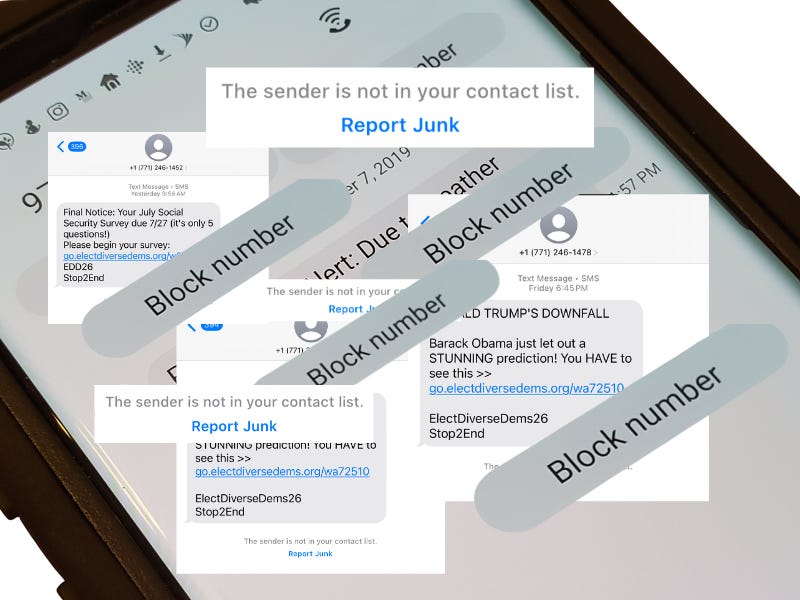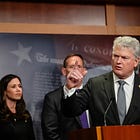The War on Political Spam Texts and Social Ads
Under the radar rules from Apple and Meta set to alter the political texting game in a good way
Support independent journalism, $5/month, $50/year. No billionaires, no bribes.
Over the past few days, two of the largest tech companies in the world have taken aim at political text spam and online ads. The next Apple operating systems will begin offering the ability to filter texts, including those from politicians and, soon, Meta will ban political ads on their platforms in European Union states.
These are the kinds of under-the-radar but monumental shifts in elections I write about in my book Modern Political Campaigns: How Professionalism, Technology, and Speed Have Revolutionized Elections. Problem is these two moves just happened. The second edition, published by Bloomsbury, dropped in April this year.
Consider this a partial preview of the third edition … dropping in 2027.
Political Texts as Spam
Why filter political texts? Let’s just say that they’re so ubiquitous that the statistics on the collective volume, just in the United States, are almost hard to believe. During the 2022 cycle, Americans were on the receiving end of more than 15 billion political texts. The final numbers aren’t widely reported but the best estimate is a 3x increase in 2024.
How many voters will do this? Not zero, but it won’t add up to $500M in lost GOP revenue. Still, this is the most significant shift in the standard election playbook in quite some time.
Reminder: the eligible voting population is 244.4 million. Back of the envelope math shows that each eligible voter got 184 (!) texts and we know that targeting leaves some blissfully uncontacted.
That’s a lot of angry voters. So, there is a problem to be solved and kudos to Apple for offering up a solution. However, the unintended consequence of releasing a public beta is that politicos have smartphones, too, and they’re not happy.
On Monday, the National Republican Senatorial Committee released a freak-out memo, first reported by Punchbowl News outlining the potential financial carnage:
- 70% of small dollar donations come via text, and 60% of U.S. mobile devices are iPhones.
- In iOS 26 voters, political texts will be treated as spam and silently sent to an “Unknown” inbox without alerts or notifications.
- The “macro effect, could be over $500M in lost GOP revenue.”
- Impacts on voter contact, including get-out-the-vote, voter persuasion, rapid-response, and election-day reminders will all be affected.
Now, most of this is overblown. The filtering in iOS 26 is opt-in, meaning that you or someone in your family need to find the right place in settings to flip the switch. Opt-out would’ve been catastrophic for campaign teams.
Opt-in is a relative inconvenience. On Apple’s latest developer beta (v.4) it takes seven steps to do this (full story here from Apple Insider).
1. Open the Settings app
2. Tap on “Apps”
3. Tap on “Messages”
4. Scroll down to “Unknown Senders”
5. Switch to the right (green) “Screen Unknown Senders”
6. Tap on “Text Message Filter” and select “Text Message Filter” from “None”
7. Switch to the right (green) “Filter Spam”
Again, how many voters will do this? It’s not zero, but it is not going to add up to $500M in lost GOP revenue. Still, this is the most significant shift in the standard election playbook in quite some time. If users opt-into this filtering they’re basically gone.
To be fair, even when you type “Stop” when solicited in a political text, you’re often still on various lists that get shared so you never leave the doom loop of getting, stopping, then blocking the number.
It is because of this that the new iOS 26 feature is so useful and I’m guessing that voters who have either volunteered on a campaign or given to one and are spammed by every candidate will want to find another way out.
If I’m Apple, I’m on the side of voters (users). If I’m the NRSC, I’m on the side of candidates. Frankly, if you talk with consultants, you realize that we’re already on the wrong side of the curve in terms of number of texts sent to number of dollars donated. We’ve reached peak political text, and Apple is simply accelerating the decline.
We’ll see how far this goes but my guess is that this relatively modest opt-in screening of texts will be relegated by (1) how hard it is do turn it on, and (2) that smart candidates and groups will simply send contact cards to their lists right now in advance of the release of iOS 26 in September so they can get around the filtering.
Yes, this doesn’t solve the long-term problem, but we’ll get to that in a bit. Now, let’s talk about the other big change this week: Meta killing political ads in the EU.
Political Ads as Antisocial
After going all-in on elections, Facebook has been steadily moving away from them. Some of it has to do with the rise of Trump and the backlash on the Left. Some of it has to do with the rise of aggressive memes on the Right. A lot of it has to do with the personal targeting of Mark Zuckerberg.
Tech companies thought politics would spike engagement, and it did. But it spiked governmental scrutiny as well, and for good reason.
But there’s also a fair bit of evidence that while political engagement online has its virtues, it has broken relationships, even within families. Online hate is a public policy problem, but purchased political engagement is something Meta can regulate on its own.
This week, Meta announced it is pulling the plug on political advertising in the European Union. This has been long in the making. After the 2016 Cambridge Analytica scandal where that company blew open loopholes left hanging by Facebook to hypertarget individual voters on their personality profiles, the platform pulled back on which tools political candidates could use, limiting the potential reach of campaigns.
Meta also launched an online repository for all political ads so voters can see who sponsored them, and how much they spent. This was welcome transparency but the question of advertising remained hot, especially in the EU.
The Transparency and Targeting of Political Advertising(TTPA) imposes a new wave of restrictions that Meta characterized as “unworkable” so they are pulling political ads from their platforms altogether. Reminder: Meta includes Facebook and Instagram, but also WhatsApp, which is widely popular in Europe. It also includes Threads, their text-based platform that has almost caught up to X (formerly Twitter).
It is unlikely that this will find a home in the United States, given the First Amendment and the concern over an opt-in text message screening feature on iOS 26. But, still, this reflects how much paid political speech is being shunned by once-supportive mobile and social technology companies.
Could Meta follow suit on its own in the United States? TikTok has banned them and they’ve leapfrogged Facebook. Bottom line: look at the EU experience as the test run to a voluntary banand for political marketers to test it in court.
In the meantime, what should and will campaigns do?
Solutions: Real Relationships
As the rules governing algorithmic political tactics change, the one thing that will not is the need for candidates to form relationships with voters. This might seem to be almost too obvious, but there has been a counter-shift in political strategy away from relying on platforms like Apple’s and Meta’s to bring voters to candidates.
The shift has been toward relational organizing, essentially, friends and family of supporters being contacted on behalf of candidates. Unlike spam and ads, relational organizing is a slow burn. You need to first understand every person is also a potential network — everyone knows people and they vote. Deputizing those voters expands the network so it becomes yours, not Apple’s or Meta’s.
A candidate asks you for money and it is spam. A friend asks you to give money to a candidate and you begin a conversation: what is the candidate like, do they support what I believe, can they win?
The relationships built this way are more enduring because they were built on people and their connections, not modeled voter lists or social media algorithms. A great Substack to learn more about relational organizing, even if the GOP isn’t your party, The Relational Republican.
The technology supporting this kind of relational organizing is also not new. It’s become standardized over the past two cycles. Voters are given higher scores for outreach based on their prior behaviors and relationships.
Finally, it will force campaigns to do more of the hard work of building grassroots support rather than simply buying access to voters. We might even get better candidates.
This is a good shift, and one that will better reflect how voters feel and behave, as well as respecting their right to be left alone.
Michael D. Cohen, Ph.D. is the author of the book Modern Political Campaigns, president of Cohen Research Group and a 30-year veteran of the polling industry. He writes The Level regularly for 24sight News, analyzing polling and campaign trends with a keen eye and level-headed approach.
Help build the 24sight News community. Sign up, follow, subscribe, share, comment. Support the mission of real journalism, accountability, speaking truth to power.
YouTube | Bluesky | TikTok | X (when necessary) | Substack
News that gets through in DC, VA, PA
Sponsors of 24sight News get in front of our highly engaged audience of decisionmakers, professionals, thought leaders, national media and more. Top readers include heavy engagement in Northern Virginia, the suburbs of Philly and Pittsburgh and Capitol Hill.
Get in touch to discuss sponsorship options: sales@24sight.news.




